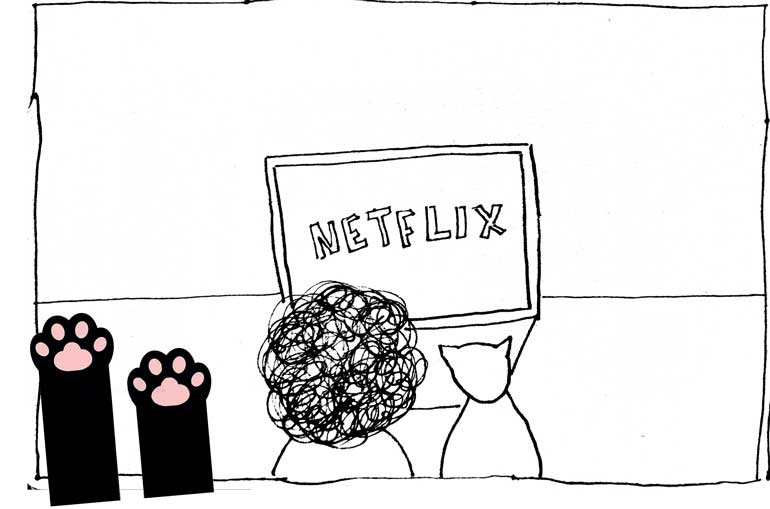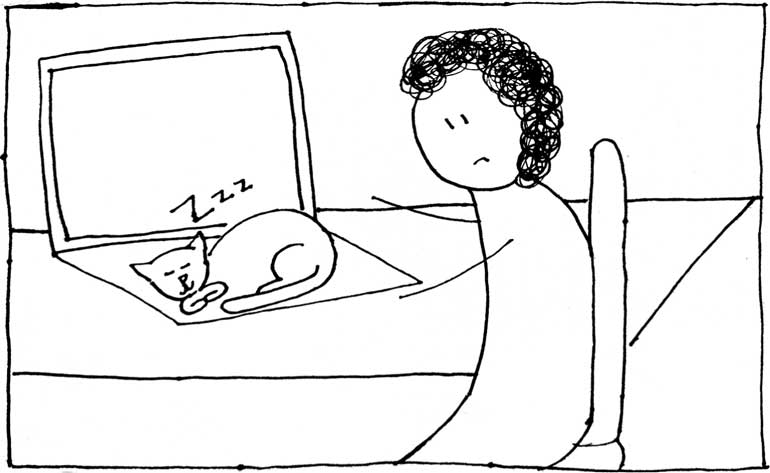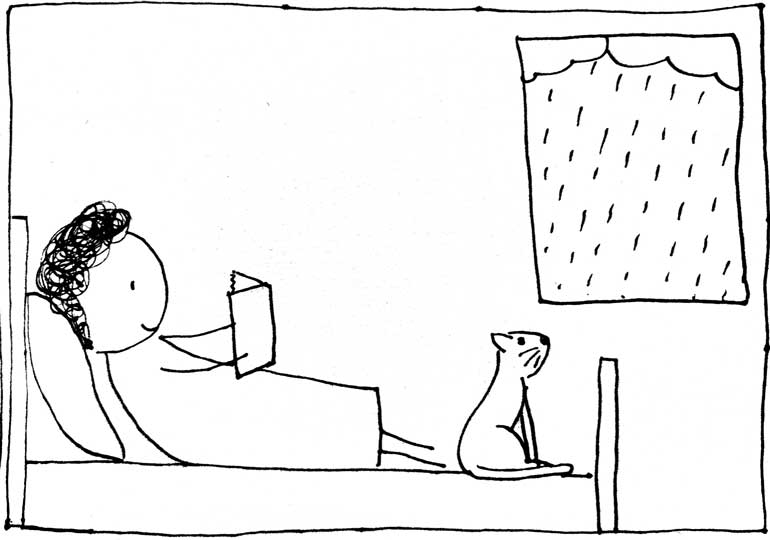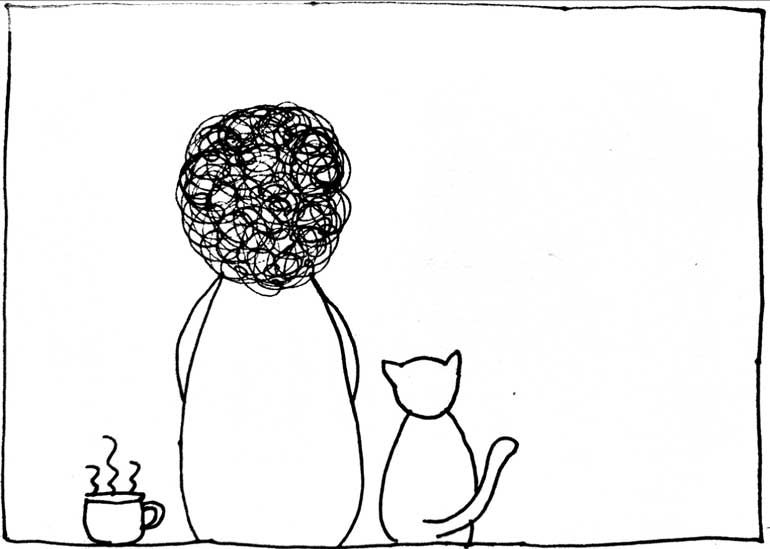Thursday Feb 19, 2026
Thursday Feb 19, 2026
Saturday, 2 October 2021 00:15 - - {{hitsCtrl.values.hits}}

Some semblance of normalcy is brought to your life by your cats
|
By Shailendree Wickrama Ad ittiya
When we talk about COVID-19 and the impact of the pandemic, we look at the economy, healthcare system, education and various other industries. Even when we talk about the impact it has had on our health, both physical and mental, we tend to focus on the direct impact COVID-19 can have on our physical health and talk in a more abstract way about how the pandemic has affected our mental health.
However, if we are required to be completely honest, we can admit that we have not dealt with the pandemic and resulting lockdowns that well on a personal level. Over the months, it has become easier to admit to loneliness, sadness, and how making the bed in the morning is perhaps the only task you tick off your to-do list that day.
Getting through the months has not been easy. The fear of a highly-transmissible infection, deadly variants, loss of our usual support structures, and uncertainty about the future has had a toll on our mental health. Through it all, friends and loved ones have reached out. Technology has helped bring some normalcy to our lives. Work has kept us distracted from everything going around us.
Above it all, however, has been the comfort of a cat dozing off next to your laptop as you work or curling up against you as you spend night after night struggling to fall asleep. The quiet meow you hear before feeling that soft but warm body rubbing against your feet. Finding some joy, a reason to laugh, as you watch your cats get the zoomies.
Daily routine
Many can agree that the pandemic threw our daily routines out the window. No longer were we waking up early, having our tea and breakfast, rushing to work, having lunch with colleagues, going out with friends in the evening, returning home for dinner and going to bed at a decent hour.
Working from home has meant long days spent searching in vain for motivation and evenings struggling to meet deadlines. It has meant skipping meals, late nights, and a loss of interest in life. Depending on the type of work you do, you may find that the only people you talk to are those you live with.
Through all of this, some semblance of normalcy is brought to your life by your cats. Pandemic or not, they demand their usual bowl of milk at 6 a.m. and breakfast an hour later. They need a post-nap snack, lunch and then an evening snack. Like clockwork, they find their way to the kitchen close to dinnertime.
Having someone who depends entirely on you for food forces you out of bed. It makes you try harder to get things done.
This does not mean that it is true when they say that cats only love you because you feed them. In fact, this is far from the truth.
Cats may not want to admit this, but they do not like being by themselves. They want to be around their humans as much as possible. If their human is reading in the living room, they will find a spot close by, curl up and fall asleep.
If they wake up to find their human is leaving or has already left, they will make their way to the place their human is or was, curl up and fall asleep. There are also times when they demand more attention. They will not ask your permission before hopping onto your lap, sitting on your feet, or standing outside a closed door, waiting until you open it.
They dislike it when you do something without them, following you around and overreacting when you accidentally step on their tail.
They also talk to you. Some cats are extremely chatty and will respond in their own language. They do not seem to judge you and, even if they do, you won’t really understand what they are saying. This makes it easier to talk about things that are bothering you, things you are not ready to share with another human yet.
Fears about the future, failure to accomplish the most basic of goals in life, and questions about love and friendship are all things our cats have heard me talk about. They may not quite understand these human problems, but their presence is comfort enough.
Idyllic lives
Haruki Murakami’s writing has the ability to transport the reader from the real world they occupy to an in-between land, where Murakami’s characters feel real but also fictional. When you read multiple Murakami novels, especially one after the other, it can become difficult to tell characters and stories apart due to similarities in names, words, actions and needs.
Cats make regular appearances in his work, especially in ‘Kafka on the Shore’. In it, Mimi, a cat, tells Nakata, a human, “Most people look at cats and think what a life – all we do is lie around in the sun, never having to lift a finger. But cats’ lives aren’t that idyllic. Cats are powerless, weak little creatures that injure easily.”
Mimi goes to say that cats do not have shells like turtles, nor wings like birds. “We can’t burrow into the ground like moles or change colour like a chameleon. The world has no idea how many cats are injured every day, how many of us meet a miserable end,” Mimi says.
There are several Haruki Murakami quotes about cats but this particular quote stands out because it is a reminder of how cats need a lot of taking care of. Most cats in Sri Lanka are allowed to roam around freely, even going missing for days and returning home scrawny and hungry. This is not true of our cats, one who is allowed outside unsupervised once or twice a day and the other who is only allowed supervised walks.
This is not only because we are trapped in an unshakeable fear of the harm that might be caused to them, but also because the loss of even a single cat makes one realise how easily they can go through their nine lives.
The ache you feel for a cat who asked to go out in the morning and is yet to return by dusk reminds you that you are capable of feeling so much, especially when the pandemic has robbed that from you. You find that you are no longer as shaken by the thought of over 200 deaths that occur in a day due to this one disease. You find that the number COVID-19 patients detected in a day, even when they include people you know and love, does not affect you like it did last year.
When your friends tell you about the tough times they are going through, whether it is due to the end of a relationship, distance from family, or loss of a job, you find the energy to listen to them and lend a shoulder to cry on, but you sometimes find that you simply do not care.
This sounds harsh, like we are losing those precious qualities that make us human, but we have been desensitised to death, illness, loss, pain, and hurt during the past year and a half.
Cats remind us that it is still possible to feel, to ache, to care, but not necessarily because their lives are more precious than humans. There cannot be a comparison between the two. It is not fair.
The hours spent worrying about a cat who is yet to return home or who skips a meal also gives us some solace that we are able to return some of the love cats show us, that they do not feel like us humans are unaware of just how many cats are injured every day or meet a miserable end.
We are, which is why we spend so much of our time worried about them.
Nine lives
Cats may or may not have nine lives. They may have one life, nine lives or even a hundred. They may even have an endless number of lives. We will never know, but it doesn’t really matter.
What you do know is that you get one life with them. This life is measured in cat years and not human years, so the time you have with a cat is simply not enough. And yet, the thought that they choose to spend this one life with you is reason enough to fight the pandemic blues and get through the tough times.

Cats will make their way to their human, curl up and fall asleep

It is not true that cats only love you because you feed them

Cats want to be around their humans as much as possible